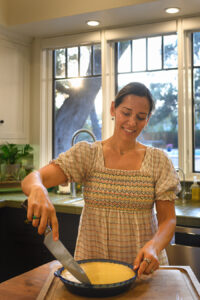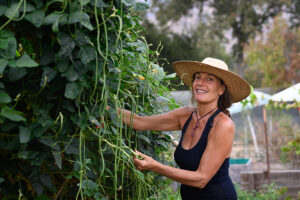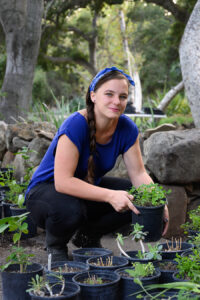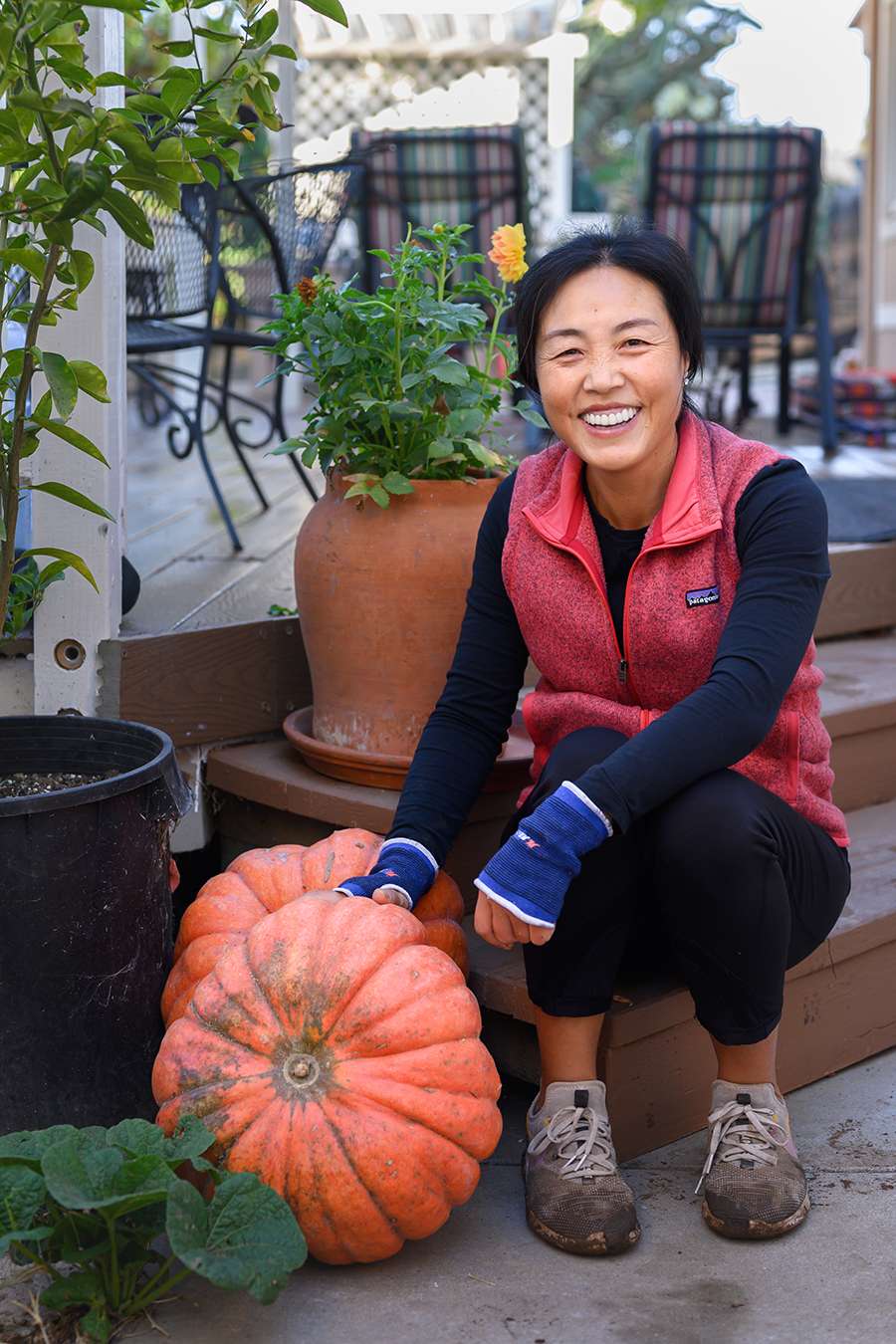FEATURE | By Ellen Sklarz
Women Gardeners Dig In During Pandemic
Photos by Simone Noble
Since the COVID-19 national emergency was declared in mid-March 2020, the fabric of life has shifted in form. The initial shock of no toilet paper or hand sanitizer transcended fear of illness. Face masks have ranged from fashion statements to points of contention.
Zoom and social distancing entered the lexicon, while jobs have been lost, furloughed, or re-created in this recalibrated new reality.
While front-line and essential workers kept the rest of us safer, this unprecedented pandemic also kept countless people homebound and grounded. And when that ground started feeling shaky, many started digging in the earth.
Historically, the Ojai Valley community is resilient and adaptable. As many turned to nature for sustenance and community, the contagious allure of gardening beckoned novices and seasoned greenskeepers alike. In the next pages, we introduce you to a group of interesting, diverse women who have created and cultivated glorious, unique gardens that feed, nurture and nourish themselves, their families and, often, friends, neighbors and those in need.

Megan Pense
Megan Bense
Megan Bense is one of the few people who can seamlessly relocate from Camarillo to Ojai during a pandemic while oozing boundless excitement about landing here. Initially, Bense, her wife Christine, both originally from Canada, and their three sons dreamed of a self-reliant life on a large farm. However, they are thrilled about living in Ojai on a one-acre property, which houses their family, four dogs, and a large, abundant garden, as well as varied fruit trees that were inherited from the previous owners. Says Bense, “Being here in Ojai in our beautiful neighborhood and having this incredible garden … it all makes me feel really happy and appreciative.”
Bense is being mentored by her oldest son, Liam, 15, whose interest in horticulture started at a young age. “I’ve had my garden for a really long time. I started out growing native plants and then moved into food,” he says. “Mom’s been supportive, but it’s never been anything she was keenly interested in until recently, when she realized that if toilet paper can become such a commodity, so can food. “
Supply shortages in the markets initially fueled the family’s serious discussions about how much of their food supply and basic needs came from grocery stores. “We started asking ourselves,” says Bense, “‘How can we make ourselves more self-sufficient and be better prepared?’ That led to wonderful, deep conversations and brainstorming among all of us. The garden that you see unfolding today is a great extension of those conversations.”
They intentionally planted fruits and vegetables that provide a high amount of nutritional and caloric value, including avocado, bananas and goji berries, blackberries and marionberries, and tomatoes, beans and peppers. Fall brought quinoa and amaranth, onions, garlic, sweet potatoes, kale, carrots, corn, and more. “I love to cook and bake,” says Bense. “We planned the garden around what we eat often. Whatever Liam brings to me will be used to make healthy, delicious food.” Middle son Niall, 13, enjoys working in the kitchen, while Keir, 6, supervises the entire operation.
Liam’s conservation practices include a drip system, improving soil health with compost and mulch, and the use of biochar, a charcoal-like, carbon-rich substance that increases productivity by locking in water and nutrients. Because of COVID, Liam attends school at home via Zoom, so he has more time to work in the garden. Bense tells us that they’ve never had the space for so much variety and that Liam actually brought seeds, plants and raised beds from their Camarillo house. Next year, she will be canning, and the family plans to donate surplus produce to food-share programs.
Bense says that being in the garden “brings about a sense of purpose and makes me feel extremely content and secure to know that our family is producing our own food. Seeing my son out here, using his hands to do something meaningful … there are no words. I feel like I’m living my dream life right now.”

Cindy Kalmenson
Cindy Kalmenson
“I am a self-taught gardener,” says Cindy Kalmenson. “The plants teach me everything.” Clearly, the plants have one great student.
As singer-songwriter-jewelry designer Kalmenson guides her guests through her lush, ever-evolving natural world, she explains that the garden has quadrupled in size since the pandemic infiltrated daily life. “And that’s because my therapy was digging in the dirt,” she says. “The backyard was one big weed patch since no one had lived here for two years before we bought the house. I can’t stand weeds, so I went out there and started taking out the Bermuda grass.”
She met her husband, Alaska native Terry, on a camping trip in Baja. The couple moved from Nashville to their Ojai home about 12 years ago with their then-three-year-old daughter, Sara Eden. Terry, a skilled wood turner, has built a greenhouse for garlic sprouts, peas, spinach, celery and cilantro. Summer brought tomatillos, eggplant, zucchini, apples, green beans, and more. For fall, Kalmenson prepared beds for garlic, onions, root vegetables, broccoli and cauliflower.
“If we are going to talk about global warming,” says Kalmenson, “those of us who grow our own food should not allow any of it to go to waste. This would lessen the need to contract large trucking companies to deliver food from other areas into Ojai. For residential growers, she says, “we can also make sure that not one morsel makes it out of this town since it can all be shared.”
Unless, of course, she is bringing fresh produce to her mother, who lives in Tarzana, her hometown.
After the rains last March, Kalmenson‘s garden was so abundant that she’d drive to her mother’s house with a car full of food. During those spring months of COVID living, Kalmenson also connected with neighbors and friends and found lovers of her abundant crops such as okra, zucchini and eggplant. “Food is nourishing and makes people happy,” she comments. “Food unites people and takes care of all the differences we have.”
Kalmenson continues, “What I love about gardening is that plants do not lie. You learn so much from them because they show you what works and what doesn’t. When you overcrowd your plants, they don’t thrive and can’t spread out. The leaves don’t want to touch each other; they want enough space to open up to the sun. For the future, says Kalmenson, “We can really increase the amount of community gardens with volunteers who teach these types of skills so that we can grow food by working together across all ethnicities and ages.”
Kalmenson reflects further about the magical allure of this world she has created near downtown Ojai. “What I feel in the garden is enchantment and a responsibility to uphold what is Mother Nature’s most amazing design . And everything makes sense. The laws of nature prevail as a model for answering many of life’s questions. Life’s lessons can be found right there in the garden. Everything a plant needs, a person needs, too.”

Tara Saylor
Tara Saylor
Many would be intrigued by a woman who refers to herself as a “human multi-tool.” That woman is Tara Saylor, whose years of travel brought her back to her hometown of Ojai.
When the pandemic was declared, Saylor’s work in event planning abruptly halted. She promptly did odd jobs as a handywoman and was asked by a friend for help painting houses. That same friend would soon become her business partner in a home and ranch restoration company with the goal of creating ecological food forests.
Saylor sees this unprecedented time as providing an opportunity to move into a deeper relationship with the land of the Ojai Valley and to transform one property at a time into self-sustaining earth. “Initially, the biggest thing was slowing down,” says Saylor. “I saw so many people turning inward, including myself.” Then came the questions. “How do I take care of myself? How do I take care of my house? A lot of that came down to a garden … food, nutrients, and being able to go through the process of planting something, nurturing it, growing it, and then eating it.”
About a year ago, Saylor’s family bought a home in town. They complied with the Resilient Landscapes Program through Sierra Watershed Progressive, using gray water and planting vegetables and fruit trees. Saylor is thrilled to go over and work with her three-year-old nephew, Forrest, the son of her brother and sister-in-law. She says, “We garden together, and watching Forrest get close to the plants is so rewarding. If he sees one tiny strawberry, he can’t wait to taste it.” She adds that watching her mother, Charys, create that bond with her grandson is a reminder of how she was raised — with a garden in their backyard. For Saylor, “Hanging out with the plants and getting dirty feels so natural to me.”
After she returned to Ojai, Saylor also started working at Pans Garden Nursery, created and owned by her lifelong friend Nathan Whitman. When the pandemic was declared, Saylor and Whitman started a delivery system for bringing plants to many local residents, especially those with pre-existing conditions who needed to stay home.
In recent months, Saylor and her business partner worked on a five-acre property in Meiners Oaks, while also beginning on a 20-acre parcel. Whether planting a large property or her family’s backyard, Saylor sources from Whitman’s nursery since he offers herbs, California natives, gourmet and medicinal mushrooms, as well as varied exotic, medicinal and water-wise plants.
Now that Saylor the “human multi-tool” is back home, she is
here to stay and wants to continue to contribute to the community and nurture the land. When working in the garden, she says, “I feel fluid, centered, awake, present. I start noticing things more … like a bug, or a new growth realigning with purpose and evolving. I think that our simple purpose on this earth is to evolve.”

Carolina Lobo with daughter
Carolina Lobo
A native of Chile, Carolina Lobo first came to the United States as a university student majoring in agronomy. After returning to Chile and earning another degree in engineering, Lobo returned and spent five years working in Oxnard. Marriage to lighting designer (“mi amor”) Steve Cooper and the birth of their daughter, Amaya, brought the family to Oak View.
Lobo is manager of a large company with oversight responsibility for food safety and compliance dealing with foreign suppliers whose goods are brought into this country. Because of her studies and her work, Lobo knew how to grow food on a large scale, but since settling in the valley four years ago, she was interested in growing large amounts of food in a small space. As a vegetarian and new mother, she knew her younger days of fries and beer were long gone.
Since the backyard of the Lobo-Cooper house became a dedicated play space for Amaya, Lobo decided to grow her crops in front. After letting the lawn go, she wanted a no-till garden. She chose to plant seeds and starters in hay bales, which serve as natural raised beds, while providing soil replacement and improving productivity. Since Lobo and Cooper work from home, the garden has become a family affair, with Amaya selling pumpkins to the neighbors so she could buy a longed-for Halloween costume.
The family’s summer bounty included maize, cucumbers, tomatoes, varied squashes, string beans, kale, and watermelon, blueberries and figs. As the seasons changed, fall and winter months produce a variety of root vegetables, Brussels sprouts, peas, lettuces and broccoli.
Prior to moving to the valley, Lobo missed the camaraderie she felt at home in Chile. Here, however, neighbors welcomed the family the day they moved into their house. And since their fruit and vegetables are grown in the front yard, people stop by to admire her crops and socialize. Since the beginning of the pandemic, others on the street have expanded their own gardens, and they all started sharing. One man built a stand for extra vegetables and fruit, with books then arriving on the shelves, creating a small neighborhood library. Says Lobo, “This is the way I grew up. To know your neighbors and understand when they are going through difficulties. And when someone loses a job or isn’t well, you can bring them what they need without them asking for it.”
Lobo’s intention is to buy less and learn to eat whatever is in season. “When you go to the supermarket to buy tomatoes or melons year-round,” she says, “you lose the excitement of waiting for the summer to eat watermelon and peaches. I had forgotten that sensation for a long while.”
Lobo is thrilled that her family is eating healthfully and seasonally. When she is working in the garden, she says, “I feel a sense of freedom, of being connected with nature in my front yard
. . . kind of going into a forest but a little forest. I leave the inside of my house — which is also my office since I work at home — and go to another dimension. I feel very empowered.”


Leave A Comment